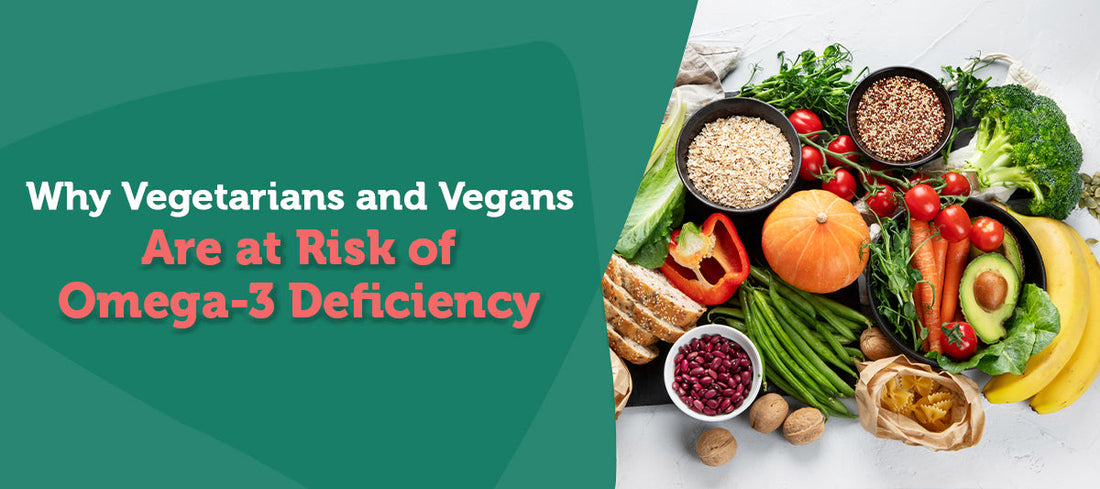
Why Vegetarians and Vegans Are at Risk of Omega-3 Deficiency?
Omega-3 fatty acids are essential fats that the human body can’t synthesize. It means you should rely on dietary sources, preferably supplements, to get the right dose of essential fats. Omega-3s are crucial for overall health, especially brain function and cardiovascular health. Though Omega-3 supplements are suitable for all, they are more important for vegans and vegetarians because they are often deficient in Omega-3 fatty acids.
Does a Vegetarian Diet Lack Omega-3 Fatty Acids?
Omega-3 fatty acids are a longer chain of essential fats including ALA, DHA, and EPA. It isn’t that a plant-based diet lacks Omega-3 fatty acids, but you get only ALA. If you are a vegetarian, you are more likely to develop a deficiency of essential fats.
Understanding Omega-3 Fatty Acids
1. Alpha-Linolenic Acid (ALA)
It is a natural compound that can help lower blood sugar levels and relieve symptoms of diabetic neuropathy, such as pain, burning, and numbness in the arms and legs. It helps reduce inflammation and increase bone density. A plant-based diet including flaxseeds, chia seeds, walnuts, hemp seeds, tofu, and soybean oil is a reliable source of ALA.
2. Eicosapentaenoic Acid (EPA)
Primarily found in fish and algae, EPA has amazing benefits for your health. It can reduce the risk of heart disease and stroke. It can prevent blood vessels from clogging and improve coronary artery function. It could help with depression and anxiety. EPA is especially beneficial for children because it helps with growth and development. Vegetarians can take Omega-3 supplements to get EPA.
3. Docosahexaenoic Acid (DHA)
An essential fat found in fish and algae, DHA supports brain function by reducing plaque formation in the brain. It is recommended for children due to its brain-boosting properties. In addition to brain function, DHA is also good for the eye, skin, and joints. DHA can reduce muscle soreness and stiffness after exercising or a hectic physical activity.
Why Vegetarians and Vegans Are at Risk
1. Limited Direct Sources of EPA and DHA
Omega-3 fatty acids are a longer chain of essential fats, including ALA, EPA, and DHA. A vegetarian diet can be a source of ALA but can never provide the other essential fats. Research puts the conversion rate from ALA to EPA around 5-10% and DHA around 1%.
2. Poor ALA to DHA Conversion
The conversion rate depends on multiple factors, including genetics, aging, and overall diet composition. Also, you need micronutrients such as zinc, iron, and B vitamins to strengthen the conversion process.
3. High Intake of Omega-6 Fatty Acids
A plant-based diet provides plenty of Omega-6 fatty acids. Overconsumption of Omega-6s can create an imbalance with Omega-3s and contribute to chronic diseases like heart disease and arthritis. The ideal ratio of omega-6 to omega-3 is around 4:1, but many plant-based diets have a ratio closer to 15:1.
4. Lack of Awareness and Supplementation
A lack of awareness and education on Omega-3 fatty acids can lead to nutritional deficiency. If you are a vegetarian, you should buy an Omega-3 supplement that contains all essential fats.
Health Consequences of Omega-3 Deficiency
Dry skin, brittle nails, fatigue, joint pain, mood swings, poor memory, and difficulty concentrating are some of the common symptoms found in Omega-3 deficient people. A deficiency in Omega-3 can create multiple problems related to brain function, heart health, vision, looks, and mobility.
Strategies to Prevent Omega-3 Deficiency
1. Increase ALA-Rich Foods
Some of the best foods for ALA:
- Flaxseeds and flaxseed oil
- Chia seeds
- Walnuts
- Hemp seeds
- Brussels sprouts
- Canola oil
- Tofu
- Edamame seeds
- Pumpkin seeds
2. Reduce Omega-6 Intake
Remove foods high in Omega-6 acids like processed plant-based foods and soybean oil. Overconsumption of Omega-6 can lead to an imbalance in Omega-3s.
3. Algae-Based Supplements
Most vegetarians rely on fish oil capsules and other supplements to increase their intake of EPA and DHA. It is better to take Omega-3 supplements enriched with all essential fats.
4. Optimize Nutrient Intake
Consuming a well-balanced plant-based diet that contains all essential nutrients, especially ALA and supportive micronutrients, can fulfill your need for Omega-3s without supplements.
5. Monitor Omega-3 Status
Keep checking your Omega-3 index to determine whether you need supplements. If yes, then start them as soon as possible.
Not all vegetarians are Omega-3 deficient, but most develop a deficiency at a certain age. Omega-3 supplements can boost your overall health. If you are a vegetarian, you should seriously consider starting Omega-3 supplements because you are more likely to be deficient in essential fats.






